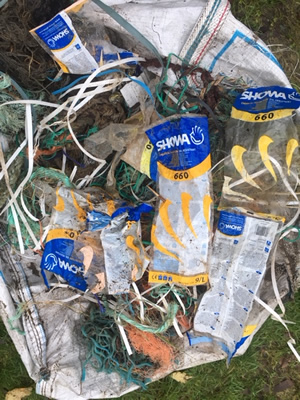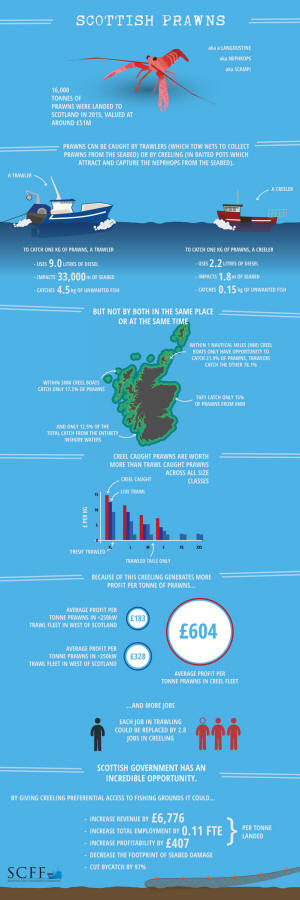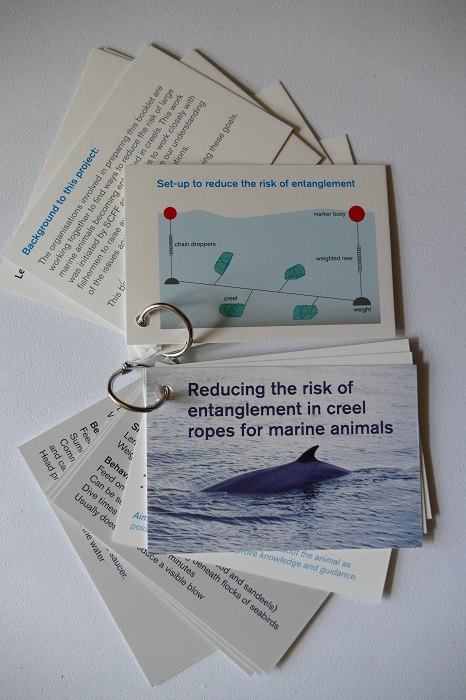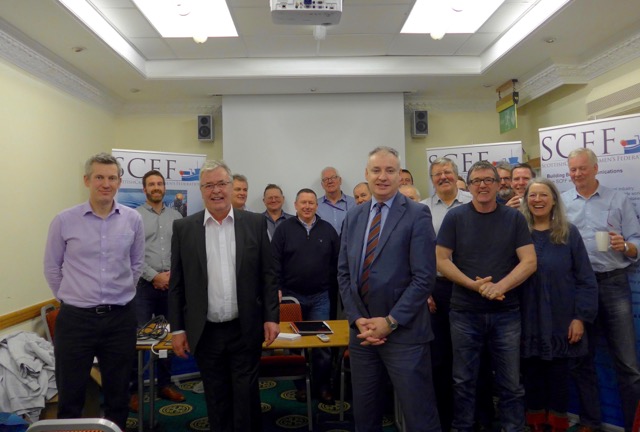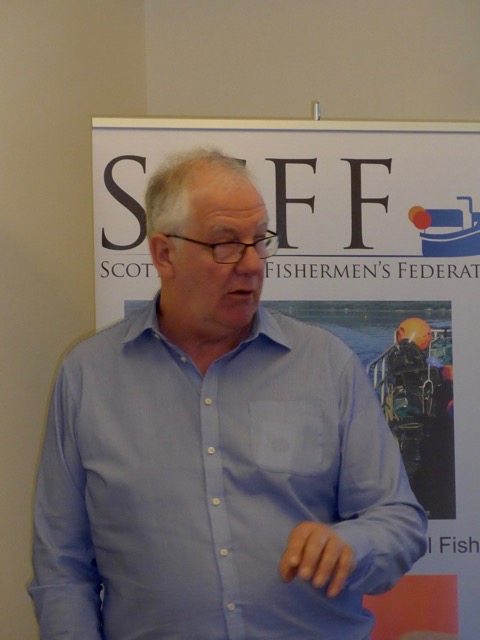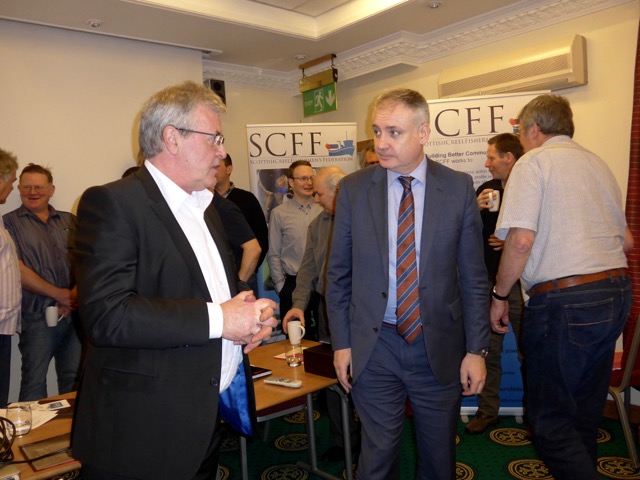Written by Liam Kirkaldy on 6 August 2015 in News
Claims that MPAs will damage the fishing industry
and could even lead to deaths are “foolhardy” and do
not represent the majority of industry views, says
SCFF
Claims that Marine Protected Areas (MPAs) will
damage the fishing industry and could even lead to
deaths are “foolhardy” and do not represent the
majority of industry views, according to the
Scottish Creel Fishermen's Federation (SCFF).
The Scottish Government has proposed 30 new MPAs
aimed at protecting vulnerable environments.
SCFF National Coordinator Alistair Sinclair hit back
following warnings from the Scottish Fishermen’s
Federation (SFF), as well as the Scottish
Conservatives, over the effect new MPAs will have.
The BBC reported SFF chairman Bertie Armstrong as
saying: “It could be, and I'm choosing my words
carefully here, devastating. If you want to take a
local community and result in a clearance, this is
the right way to go about it.”
Meanwhile Calum MacLachlainn, of Isle of Mull
Scallops, said: “If they take away our winter
grounds, we'll be forced out into areas which are
more exposed. The way the Scottish Government is
going with the MPAs and listening to the
anti-fishing lobby, I think we'll see funerals
before someone changes their mind.”
But Sinclair questioned these claims, telling
Holyrood: “Government stats show creel fishermen
make up about 80 per cent of the inshore sector.
Without stating that the SFF are an irrelevance,
they do seem to think they are masters of all that
happens around the coastline of Scotland, and that
is a nonsense, in particular in inshore waters.”
He also called into question claims that the new
protections could lead to deaths.
Sinclair said: “The notion that people will die at
sea is a foolhardy claim, because you just don’t go
to sea whenever it’s poor weather and there is a
likelihood that your crew’s safety will be
compromised.
“We all like to come home at night and see our
families. The fishing industry is quite a dangerous
industry and skippers need to remember that they are
duty bound by law to respect the safety of their
crew members.”
The Scottish Conservatives responded to lend
their backing to Armstrong, claiming the fishing
industry had been widely ignored by Government
ministers.
Environment spokesman Jamie McGrigor said: “Like
the Scottish fishing industry, I support the concept
of MPAs. But I share the astonishment and anger of
west coast fishermen that the compromises which they
thought had been agreed through the consultation
process were disregarded when the MPA proposals were
published.
“I have always argued that MPAs need to be
proportionate and must allow existing sustainable
fishing activities to continue. Fishermen thought
that the SNP supported this too, but its proposed
new MPAs have patently failed to achieve this.”
But Sinclair also questioned McGrigor’s comments,
telling Holyrood, “Jamie McGrigor is only supporting
one section of the industry. Now as a list MSP he
should be looking after the interests of all, not
just the select band.”
Sinclair’s comments follow claims, reported by
the BBC, that creel fishermen had been subjected to
intimidation after speaking out in favour of the
conservation measures.
He said: “I am glad to say that Richard Lochhead
has recognised that we are a good solid body of
fisherman now that have aspirations and we have
concerns.
“I think this process of creating Marine Protected
Areas has made many of our members rather nervous
due to the fact we don’t have the management plans
in place, however I have been assured that the
opportunity to put management plans together would
be stepped up between now and the actual
implementation, which may allay some fears.”
The Scottish Government has published its response to the
consultation on the management of Inshore SACs and MPAs
Scottish Inshore Creel Fishermen Wanted!
In an initiative aimed at stimulating home-market
demand, improving quality and the price obtained for
Scottish langoustine, the Scottish Inshore Creel
Support Fund is running a project to examine the use
of innovative tank systems for storing creel-caught
prawns (Nephrops) on-board vessels.
This two year trial will be for up to ten Scottish
registered vessels, landing through designated
Scottish based merchants participating in the
quality monitoring part of the programme. Successful
applicants will be able to retain the equipment
following completion of the trial.
Vessels interested in participating in the VINEP
vivier system trials are invited to contact Craig
Burton
(craig@seafoodscotland.org) to discuss the
criteria that will apply to those taking part.
The Inshore Creel Support Fund was established in
2014 by the Scottish Government to support the
inshore creel fleet. Part of this funding was to
develop new and existing markets for Scottish
creel-caught produce.
Indications of interest must be received by 25 May
2015.
Another New Association Joins SCFF- February 2015
Great news!! Another new fishermen's association
joined the ranks of the Federation at our recent AGM
in Inverness. The newly formed ' Aberdeenshire
Inshore Fisherman's Association' have been welcomed
on board and they are keen to involve themselves in
promoting our sector.
Ian Mathieson, a founding member has worked
enthusiastically to gather his group together. The
federation are confident that the AIFA will
contribute much to the further development of the
SCFF in years to come. Ian has an in depth knowledge
of the industry and the issues we all face. Welcome
Aboard Lads!!
Alistair Sinclair (SCFF National co-ordinator)
commented, This is another demonstration of creel
fishermen aspiring to protect and promote a rural
based community way of life. Furthermore in 2014 we
were also joined by the Fife Creel Fishermen's
Association, John Hoggan of the FCFA has proven to
be an asset to the federation and gives much time to
attending meetings and promoting the federation's
Aims and Objectives. Well done John!
Economic analysis of inshore fisheries - January 2015
"New research on the potential impact of mobile
fishing gear restrictions in inshore fisheries is
published today.
The research has developed a model to assess the
possible impacts of a prohibition on the use of
mobile fishing gears within one and three miles from
the shore.
The research assesses a number of scenarios and
finds that, based on the modeled assumptions, there
could be net benefits to Scotland as a result of the
gear restrictions, although it suggests these would
be outside the fisheries sector.
The research is designed to help inform thinking in
this area and the Scottish Government will now
undertake discussions with a wide-range of
stakeholders on the issues highlighted in the report
and any implications for future policy
considerations."
Full details here.
PROMOTING BEST PRACTICE FOR INSHORE FISHERIES: A
CONSULTATION ON MEASURES TO TACKLE GEAR CONFLICT IN SCOTTISH INSHORE WATERS -
November 2014
"Following the recommendations made by the Task
Force on Gear Conflict this is a consultation on
measures to tackle gear conflict.
Gear conflict is not an endemic issue in Scottish
waters but as the intensity of use of the marine
environment has increased, locally significant
occurrences have increasingly come to the attention
of Marine Scotland. Gear conflict can occur both
within and between fleet sectors and is not
conducive to the aim of ensuring fisheries are well
managed. This consultation is an open discussion on
proposals that could be introduced to tackle the
issue of gear conflict in Scottish inshore waters."
Full details here.
Succorfish Project - August 2014
We have two inshore fisheries projects that require
vessel recruitment and have sent the following
information:
1) Succorfish Project.
"This project invites skippers to test the innovative Succorfish SC2 vessel
monitoring and communication system on 300 inshore fishing vessels. The
Succorfish SC2 system uses GPS tracking that is accurate to 2 meters, and
reports vessels position, course and speed at 1 to 2 minute intervals over
Automatic Identification System (AIS), which operates through a VHF safety
channel. The technology will be installed on vessels at no cost to the
skipper/owner, and the data will be free to view in the public domain. During
and after the project the industry may use the technology to benefit their
business as they see fit. This project is available to skippers operating within
West coast IFGs, and is seeking voluntary participation across all fishing
sectors."
Two documents with more information:
These are links to TV news stories concerning the Succorfish technology and its
use in England.
http://www.youtube.com/watch?v=xwsJWiaFzI8
http://www.itv.com/news/west/story/2014-05-27/new-deal-between-fishermen-and-conservationists
2) Projects 2 &3 (Seascope): "Monitoring fishery catch to assist scientific
stock assessments" & "Identifying catch composition using technology to enable
self-reporting".
We are seeking 10 vessels (<10m) to partake in projects 2&3, which are
complimentary
Skippers will be trained in methods of stock assessment and self reporting, over
40 days (combined for all 10 vessels)
Electronic technology for collecting fisheries data will also be tested, e.g.
video cameras, GPS & rotation and hydraulic sensors
Once training is complete, skippers will be required to collect data for stock
assessment purposes from October 2014 - June/July 2014, while continuing to fish
commercially.
Skippers participating in projects 2&3, will receive minor financial recompense
subject to successful completion of the work at the end of the project in July
2015 (£ 3500 - £6000 per vessel).
Target study areas include Oban, Mallaig, Skye, Ullapool and Stornoway
The project is open to applications from vessels operating static gear (for
Nephrops, lobster and crabs) and mobile gear (for Nephrops and scallops).
Skippers can register their interest with at
georgewhite0@gmail.com, then they
will be contacted with a more detailed description of each project and answer
any questions.
Marine Protection Areas - July 2014
As of today, the 24th July 2014, 30 MPAs have been
designated under the Marine (Scotland) Act and the
UK Marine and Coastal Access Act. These will be
incorporated into the National Marine Plan and
represented in National Marine Plan interactive
alongside existing protected areas.
Full details here.
Alistair Sinclair, Chairman of the Scottish Creel Fisherman’s Federation said:
“The vast majority of fishermen operating around the Scottish inshore waters are
creel fishermen. We support a well-managed network of MPA's as forward thinking
creel fishermen recognise that practical steps are required to take better care
of our inshore waters. Properly managed, the creel sector has a very low
environmental impact and we acknowledge the need to enhance and protect area's
from destructive fishing methods.
"We all have our part to play and if the whole industry embraces MPA's we will
without doubt start the process of enhancing our marine environment creating
more opportunities for communities around our coastline.”
Fife Creel Fishermen's Association join SCFF - June 2014
We are pleased to welcome the Fife Creel Fishermen's Association to the SCFF.
We look forward to working with Fife Creel Fishermen's Association and their membership with a view to securing a better future for creel fishermen wherever they may operate. There are many challenges ahead and it is only through working together that we will be better placed to promote our sector.
Food Standards Agency lines on high PSP 2014
The Food Standards Agency in Scotland undertakes monitoring for shellfish toxins
as required by EU law. These naturally occurring toxins accumulate in molluscs
such as mussels, oysters and razor clams and when levels breach statutory
limits, harvesting of affected species is prohibited.
These toxins include:
• lipophilic toxins, including diarrhetic shellfish poisoning (DSP) toxins which
can cause nausea, vomiting and diarrhoea;
• amnesic shellfish poisoning (ASP) toxins, which can cause disorientation and
memory loss; and
• paralytic shellfish poisoning (PSP) toxins which can cause numbness,
breathlessness and in worst cases even death.
Most common in Scotland are the DSP causing toxins. 2013 saw unprecedented DSP
levels across the country resulting in large areas of closure and an outbreak of
human illness associated with the consumption of mussels from Shetland.
The toxin of most public health significance is PSP, it can be potentially
lethal.
This month we have recorded the highest levels of PSP, across some
shellfisheries in the West Coast of Scotland, since the FSA’s monitoring
programme begun.
When toxin levels are very high in molluscs, this can indicate that toxin levels
may be elevated in other species too, such as crabs and lobsters. .
Creel fishermen should therefore be aware that their catch could contain levels
of PSP that may pose a risk to health. We would urge fishermen therefore to
consider suspension of harvesting until current blooms subside, or undertaking
increased end product testing on your catch for PSP before products are placed
on the market.
Casual gatherers are strongly advised not to pick shellfish from areas subject
to toxic algal blooms until those blooms have subsided.
For further information please contact your local authority or the FSA
www.food.gov.uk
Food Standards Agency in Scotland
St Magnus House
Aberdeen
AB11 6NJ
Tel: 01224 285157
Inshore Fisheries Conference Perth 28th March 2014

Members from within the Federation attended the recent Inshore Fisheries
Conference in Perth on Friday of last week.
This time around we had the opportunity to set out our stall and network with
many likeminded folk who share our aims and objectives. Our stall was well
received and was busy throughout the day. Richard Lochhead, Cabinet Secretary
took time out to join us and allowed us the opportunity to have many photographs
taken with our youngest member of the Federation, Robbie Findlay. Richard and
Robbie discussed the workings of creel boats and Robbie was also given the
opportunity to display his expertise on the various creels he uses to catch
langoustine and lobster whilst on board the fishing vessel Venture, skippered by
Jim Hawkins of Ayrshire.
We are pleased to announce that we gained many new members to varying
associations and we are currently discussing with other associations the
possibility of them joining our Federation. Samples of our catch were kindly
contributed by James Cook of DR Collin and Son of Eyemouth and also Albert
Ritchie of the North East Creel and Line Association. These were on display
throughout the day and attracted much attention.
Richard in his keynote speech announced a further allocation of mackerel quota
for the inshore guys, which must be applauded. He praised the success of our
organisation, which makes all the hard work worthwhile. He also committed Marine
Scotland to ridding us of the act of deliberate gear conflict and indicated it
would not be tolerated.
The evening prior, some of us attended a civic reception hosted by Perth
District Council which was a further opportunity to push the Federation forward.
All in all the event must be considered a great success and the Federation would
like to thank all those who attended, in particular Bally Philp and Duncan
Finlayson from the Northwest Responsible Fishing Association in Kyle. Bally has
been ill recently but was determined to fly the flag for the Federation and we
should all wish him a speedy recovery from his illness and a return to sea as
soon as possible. Well done everyone. Finally we would like to thank Richard and
his officials for organising a successful event yet again. We hope to see more
of you there next year.
Creel support fund established. February 21st 2014
A Scottish Creel Support Fund has been launched to help fishermen badly affected
by the exceptional winter weather.
Many creel fishermen have experienced hard financial times recently due to a
combination of the extreme weather which can lead to a loss of fishing gear and
a reduction in catch.
£400,000 has been made available by the Scottish Government which will
contribute towards easing financial pressures faced by many in the industry.
Welcoming the creation of this new fund, Alistair Sinclair of the Scottish Creel
Fishermen’s Federation said:
“The creation of this fund will assist beleaguered fishermen who have suffered
severe losses over the past two winters. Many of these guys are the lifeblood of
small rural communities and this display of support from the Scottish Government
must be recognised as acknowledgement of their importance around the Scottish
coastline.
We believe that this fund was created due to extensive lobbying from within the
SCFF. It took much lobbying over several months to achieve the setting up of
this fund. Richard Lochhead recently attended our AGM and listened attentively
to representatives from every association within the Federation. It would appear
the Cabinet Secretary has been sympathetic. Common sense has been applied and
the outcome for creel fishermen affected by poor weather systems and returns has
not been overlooked. This is a win for the Federation and others who have made
representations to Marine Scotland. Well done everyone!”
Announcement and statement from Scottish Fisheries Secretary Richard Lockhead
Link to details and application document. NOTE: applications must be
submitted by March 26th 2014
SCFF AGM January 24th 2014
We held our AGM on January 24th at Inverness.
The AGM was attended by office bearers of all associations within the
Federation. Cabinet Secretary for Rural Affairs and the Environment, Richard Lochhead
MSP attended with Government officials to discuss the many issues facing our
industry.
A report of the meeting will be posted in due course.
Scottish Inshore Fisheries Conference 2014
Perth Concert Hall, Friday 28th March
Have your say on the future of the Scottish inshore sector!
Following on from the first Scottish Inshore fisheries conference, a date has
been set for the second conference in 2014. The conference will focus on
building on the 2013 outcomes, as well as addressing key issues such as Data
Collection, Sustainable Management of Inshore Fisheries, Marine Planning &
Marine Protected Areas, and Local Marketing initiatives.
The main aim of the conference is to encourage industry to get actively involved
in fisheries management, while bringing together the whole Scottish inshore
fisheries industry.
The Cabinet Secretary for Rural Affairs and the Environment, Richard Lochhead
MSP will give a key note speech at the conference, discussing progress made
over the last year as well as unveiling plans for 2014.
The one day conference will be held in Perth at The Perth Concert Hall on
Friday 28th March 2014, with a Civic Reception at The Royal George Hotel on
the evening of the 27th March (limited places available for the Civic Reception,
please apply via the registration form to attend)
RESERVE YOUR
PLACE NOW! CLICK HERE
Action on Fishing Gear Conflict
15th November 2013
A Scottish Government taskforce is being established to tackle deliberate acts of gear vandalism at sea and help resolve conflicts within the fishing industry.
SURVEY CLOSES FRIDAY 6th DECEMBER - PLEASE TAKE PART!
Full story here...
Scottish Inshore Fisheries Conference 2013
A bright future for Scotland’s inshore sector
8th February 2013
Eden Court, Bishop’s Road, Inverness, IV3 5SA
Full story here...
Moray MSP backs new fishermen's group
MORAY MP Richard Lochhead has welcomed the formation of a new federation to
represent creel fisherman along the Scottish coast.
Mr Lochhead said that at a meeting in Inverness last week, creel fishermen
from across Scotland agreed to form a new body to represent them.
This organisation will be known as the Scottish Creel Fishermen's Federation.
Full story here...
MPA Announcement Met With Caution 14/12/12
Alistair Sinclair, Chair of the Scottish Creel Fishermen's Federation, said:
"The opportunity has presented itself through the introduction of MPAs designed
to halt the further decline of the marine ecosystem in many areas around
Scotland's coastline. The SCFF cautiously welcome MPA implementation with the
caveat that restriction are not placed upon our membership, given creel fishing
has been proven to be the most sustainable method to capture shellfish.
Additionally, we hope that MPAs support the restoration of recreational sea
angling and diving opportunities in Scotland."
Full story here...
TV Chef James Martin appreciates creel fishing 30/9/13
James Martin visited the west coast and came fishing with us and appreciated the
quality creel caught prawn. An interesting twist on scampi, and James
encouraging viewers to try what he sees as one of the finest foods in the world!
Full story here...
Marine Scotland Survey of Gear Conflict 3/10/13
FAO all federation members and non members who are
fishing. It is importnant to have your say in this survey so please take a
moment to fill out. If you need bigger space for comments, please contact Alan
directly.
From: Alan Radford GRID Economics (Scotland)
Ltd.
radfordalan@sky.com
Marine Scotland is aware that there needs to be a
better understanding of gear conflict in Scottish inshore waters. Unfortunately,
much of the information required can only be obtained from those directly
involved. Consequently, Marine Scotland has commissioned GRID Economics
(Scotland) Ltd to undertake a Web based survey of gear conflict.
We would be very grateful if your Federation would
assist with dissemination of information about how fishermen can access the
on-line questionnaire to ensure their experiences and opinions are included in
the survey. The link is given below:
https://www.surveymonkey.com/s/2DXTBBY
Fishermen responding via this link are assured their
individual responses will be anonymous and only aggregated results will be
reported. Thus , that no individual or vessel will be identifiable. Their
answers will enable Marine Scotland to better understand how often and where
gear conflicts occur, the types of gear involved and the financial consequences
for those affected. In addition to factual responses, there is an opportunity
for fishermen to provide Marine Scotland with written comments on ANY aspect of
gear conflict.

